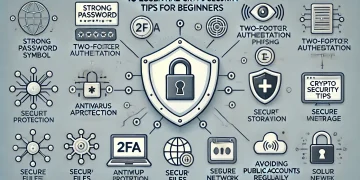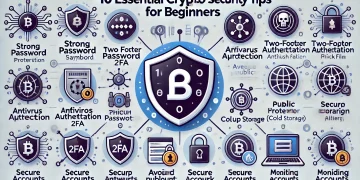In the rapidly evolving world of digital assets, securing your cryptocurrency has never been more crucial. As the value and popularity of cryptocurrencies continue to soar, so do the threats from hackers, scammers, and even simple user errors. This comprehensive guide will walk you through the best practices for safeguarding your crypto investments, ensuring that your digital wealth remains protected in an increasingly complex and sometimes hostile digital landscape.
Table of Contents
- Understanding the Importance of Cryptocurrency Security
- Choosing the Right Wallet
- Implementing Strong Authentication Measures
- Safeguarding Your Private Keys
- Using Hardware Wallets for Maximum Security
- Practicing Safe Online Behavior
- Implementing Cold Storage Solutions
- Diversifying Your Cryptocurrency Holdings
- Keeping Your Software Updated
- Understanding and Avoiding Common Scams
- Securing Your Physical Environment
- Creating a Backup and Recovery Plan
- Educating Yourself and Staying Informed
- Conclusion
Understanding the Importance of Cryptocurrency Security
The decentralized nature of cryptocurrencies, while offering unprecedented financial freedom, also places the responsibility of security squarely on the shoulders of the individual. Unlike traditional banking systems, there’s no central authority to reverse transactions or recover lost funds. This makes understanding and implementing robust security measures not just advisable, but essential for anyone involved in the crypto space.
Cryptocurrency theft and fraud have become increasingly sophisticated, with hackers employing a range of tactics from phishing schemes to malware attacks. In 2021 alone, cryptocurrency crimes amounted to a staggering $14 billion, according to Chainalysis. This underscores the critical need for every crypto holder to take proactive steps in securing their assets.
Choosing the Right Wallet
Your choice of cryptocurrency wallet is the foundation of your security strategy. There are several types of wallets, each with its own set of advantages and security considerations:
- Hardware Wallets: These physical devices store your private keys offline, making them highly secure against online threats. Popular options include Ledger Nano X and Trezor Model T.
- Software Wallets: These can be desktop, mobile, or web-based applications. While convenient, they’re more vulnerable to online attacks. Examples include Exodus and MyEtherWallet.
- Paper Wallets: A paper wallet is a physical printout of your public and private keys. While secure against digital threats, they’re vulnerable to physical damage or loss.
- Custodial Wallets: Offered by exchanges like Coinbase or Binance, these wallets are convenient but give control of your private keys to a third party.
When selecting a wallet, consider factors such as the types of cryptocurrencies supported, ease of use, reputation, and most importantly, the level of security provided. For substantial holdings, a combination of a hardware wallet for long-term storage and a software wallet for day-to-day transactions is often recommended.
Implementing Strong Authentication Measures
Once you’ve chosen your wallet, implementing robust authentication measures is crucial. This typically involves:
- Strong Passwords: Use a unique, complex password for each of your crypto-related accounts. A password manager can help you generate and securely store these.
- Two-Factor Authentication (2FA): Enable 2FA wherever possible. Authenticator apps like Google Authenticator or Authy are preferred over SMS-based 2FA, which can be vulnerable to SIM swapping attacks.
- Biometric Authentication: If available, use fingerprint or facial recognition for an added layer of security.
- Hardware Keys: For ultimate security, consider using a hardware security key like YubiKey for your most critical accounts.
Remember, the strength of your authentication measures can make the difference between a secure holding and a devastating loss.
Safeguarding Your Private Keys
Your private keys are the most critical piece of information in your cryptocurrency ownership. They prove your ownership of your coins and allow you to make transactions. Here are some best practices for safeguarding your private keys:
- Never Share Your Private Keys: Under no circumstances should you share your private keys with anyone. Legitimate services will never ask for them.
- Use a Secure Storage Method: Consider using a hardware wallet or a secure, encrypted digital storage solution for your private keys.
- Avoid Digital Storage of Recovery Phrases: If your wallet uses a recovery phrase (also known as a seed phrase), write it down on paper or engrave it on a metal plate rather than storing it digitally.
- Use Multi-Signature Wallets: For large holdings, consider using multi-signature wallets that require multiple private keys to authorize a transaction.
- Implement Key Sharding: This advanced technique involves splitting your private key into multiple parts and storing them in different locations.
Remember, if someone gains access to your private keys, they have full control over your cryptocurrencies. Guard them as you would your most valuable possessions.
Using Hardware Wallets for Maximum Security
For those serious about cryptocurrency security, hardware wallets offer the gold standard in protection. These physical devices store your private keys offline, making them immune to online hacking attempts. Here’s why they’re considered the most secure option:
- Offline Storage: Your private keys never leave the device, protecting them from online threats.
- Malware Resistance: Even if used on a compromised computer, hardware wallets keep your keys safe.
- PIN Protection: Access to the device is protected by a PIN, preventing unauthorized physical access.
- Recovery Options: Most hardware wallets allow you to set up a recovery seed, ensuring you can retrieve your funds even if the device is lost or damaged.
Popular hardware wallet options include the Ledger Nano X, Trezor Model T, and KeepKey. When using a hardware wallet, always purchase directly from the manufacturer or an authorized reseller to avoid tampered devices.
Practicing Safe Online Behavior
Your personal online behavior plays a crucial role in maintaining the security of your cryptocurrency. Here are some essential practices:
- Use a Secure Internet Connection: Avoid conducting cryptocurrency transactions on public Wi-Fi networks. If necessary, use a reputable VPN service.
- Be Wary of Phishing Attempts: Always double-check the URLs of the websites you’re visiting. Bookmark official sites and access them directly rather than through links in emails or messages.
- Verify Transactions: Always double-check the recipient’s address before sending any cryptocurrency. Some malware can change clipboard contents, potentially redirecting your funds to a hacker’s wallet.
- Use Trusted Devices: Conduct your crypto activities on a dedicated, malware-free device if possible. Regularly scan your devices for malware and keep your antivirus software updated.
- Be Cautious with Mobile Apps: Only download cryptocurrency apps from official app stores, and always verify the developer and read reviews before installing.
- Limit Information Sharing: Be cautious about sharing information about your cryptocurrency holdings online, as this could make you a target for hackers.
By adopting these practices, you significantly reduce the risk of falling victim to common online threats targeting cryptocurrency holders.
Implementing Cold Storage Solutions
For long-term hodlers or those with significant cryptocurrency investments, cold storage solutions offer an extra layer of security. Cold storage refers to keeping a reserve of cryptocurrencies offline, making them inaccessible to online threats. Here are some cold storage methods:
- Paper Wallets: Generate a paper wallet offline and store it in a secure location, like a safe deposit box.
- Hardware Wallets: As mentioned earlier, these devices can serve as an excellent cold storage solution.
- Air-Gapped Computers: Use a computer that has never been connected to the internet to generate and store private keys.
- Deep Cold Storage: For extreme security, some users engrave their private keys on metal plates and store them in multiple secure locations.
While cold storage provides excellent security, it’s important to balance it with accessibility. Consider keeping a small portion of your holdings in a more accessible hot wallet for regular transactions.
Diversifying Your Cryptocurrency Holdings
While not a direct security measure, diversification can help mitigate the risk of catastrophic loss. Here’s how to approach diversification:
- Multiple Cryptocurrencies: Don’t put all your eggs in one basket. Invest in a variety of reputable cryptocurrencies.
- Multiple Wallets: Use different wallets for different purposes. For example, use a hardware wallet for long-term storage and a mobile wallet for day-to-day transactions.
- Multiple Exchanges: If you use exchanges, consider spreading your holdings across multiple reputable platforms.
- Geographical Diversification: If using physical storage methods, consider storing backups in different secure locations.
Remember, diversification doesn’t just protect against security threats, but also against the volatility inherent in the cryptocurrency market.
Keeping Your Software Updated
One of the simplest yet most effective security measures is keeping all your cryptocurrency-related software up to date. This includes:
- Wallet Software: Whether you’re using a hardware wallet or a software wallet, always update to the latest version.
- Operating System: Keep your computer or mobile device’s operating system updated with the latest security patches.
- Antivirus Software: Ensure your antivirus software is current and regularly scanning your devices.
- Firmware Updates: For hardware wallets, always install the latest firmware updates provided by the manufacturer.
Software updates often include critical security patches that address newly discovered vulnerabilities. Ignoring these updates can leave your cryptocurrencies exposed to preventable threats.
Understanding and Avoiding Common Scams
The cryptocurrency world is unfortunately rife with scams targeting unsuspecting investors. Educating yourself about common scams is crucial for protecting your assets. Here are some prevalent scams to watch out for:
- Phishing Scams: These involve fake websites or emails that mimic legitimate services to steal your login credentials or private keys.
- Ponzi Schemes: Often disguised as high-yield investment programs, these schemes use money from new investors to pay earlier investors.
- Fake ICOs: Scammers create fraudulent Initial Coin Offerings to collect funds for non-existent projects.
- Pump and Dump Schemes: Orchestrated efforts to artificially inflate the price of a cryptocurrency before selling off holdings.
- Impersonation Scams: Scammers pose as well-known figures in the crypto community, often on social media, to trick people into sending them cryptocurrency.
- Malware: Specially designed software that can steal your private keys or redirect your transactions.
To avoid falling victim to these scams:
- Always verify the source of information.
- Be skeptical of unsolicited offers or messages.
- Never share your private keys or recovery phrases.
- If an offer sounds too good to be true, it probably is.
Securing Your Physical Environment
While much focus is placed on digital security, physical security is equally important when it comes to protecting your cryptocurrency assets. Consider the following measures:
- Secure Storage of Hardware Wallets: Store your hardware wallets in a safe or a bank deposit box when not in use.
- Protection Against Natural Disasters: Ensure your storage solutions are protected against fire, flood, and other natural disasters.
- Discretion: Avoid discussing your cryptocurrency holdings in public or with people you don’t fully trust.
- Home Security: If you store significant crypto assets at home, consider investing in a robust home security system.
- Travel Security: Be extra cautious when traveling with devices or information related to your cryptocurrency holdings.
Remember, physical threats can be just as damaging as digital ones when it comes to the security of your cryptocurrencies.
Creating a Backup and Recovery Plan
No security system is foolproof, which is why having a comprehensive backup and recovery plan is crucial. Here are some key elements to consider:
- Backup Your Wallet: Regularly backup your wallet data and store it in multiple secure locations.
- Record Recovery Phrases: Securely store your wallet’s recovery phrase, often a 12 or 24-word seed phrase.
- Test Your Backups: Regularly verify that your backups are working correctly by attempting to restore from them.
- Plan for Inheritance: Consider how your crypto assets will be passed on in case of your death. This might involve sharing access information with a trusted lawyer or family member.
- Multi-Location Storage: Store copies of crucial information in multiple secure locations to guard against localized disasters.
A well-thought-out recovery plan can be the difference between a minor setback and a catastrophic loss.
Educating Yourself and Staying Informed
The world of cryptocurrency is constantly evolving, and so are the security threats. Staying educated and informed is crucial for maintaining the security of your assets. Here are some ways to stay up-to-date:
- Follow Reputable News Sources: Stay informed about the latest developments in cryptocurrency and blockchain technology.
- Join Online Communities: Participate in reputable cryptocurrency forums and communities to learn from others’ experiences.
- Attend Conferences and Workshops: If possible, attend cryptocurrency conferences or workshops to deepen your understanding.
- Read Official Documentation: Familiarize yourself with the official documentation of the cryptocurrencies you hold and the wallets you use.
- Subscribe to Security Alerts: Many wallet providers and exchanges offer security alert services. Sign up for these to stay informed about potential threats.
Remember, in the world of cryptocurrency, knowledge truly is power. The more informed you are, the better equipped you’ll be to protect your digital assets.
Conclusion
Securing your cryptocurrency is a multifaceted challenge that requires ongoing attention and effort. By implementing the best practices outlined in this guide – from choosing the right wallet and implementing strong authentication measures, to practicing safe online behavior and staying informed about the latest security threats – you can significantly reduce the risk of losing your digital assets to theft or fraud.
Remember, the decentralized nature of cryptocurrencies means that you are ultimately responsible for the security of your assets. While this responsibility may seem daunting, it also offers an unprecedented level of financial autonomy. By taking proactive steps to secure your cryptocurrencies, you’re not just protecting your investments – you’re embracing the true spirit of decentralized finance.
As the cryptocurrency landscape continues to evolve, so too will the security challenges and solutions. Stay vigilant, keep learning, and regularly review and update your security practices. With the right approach, you can enjoy the benefits of cryptocurrency while minimizing the risks.
Your journey in cryptocurrency is exciting and potentially rewarding, but always remember: in the world of digital assets, security should never be an afterthought – it should be your first and ongoing priority.






























